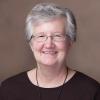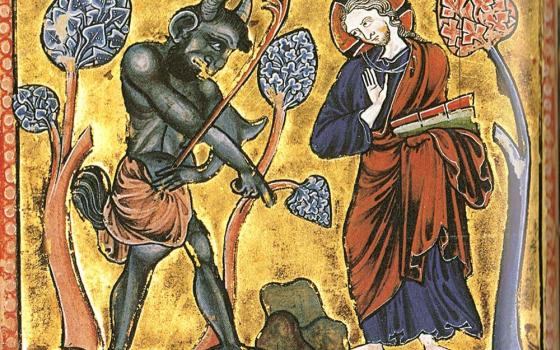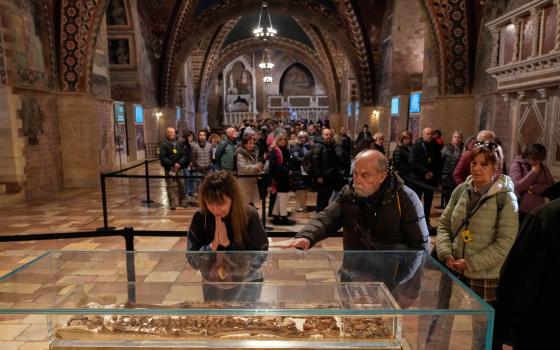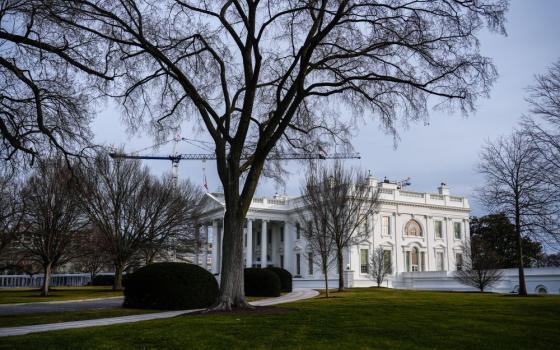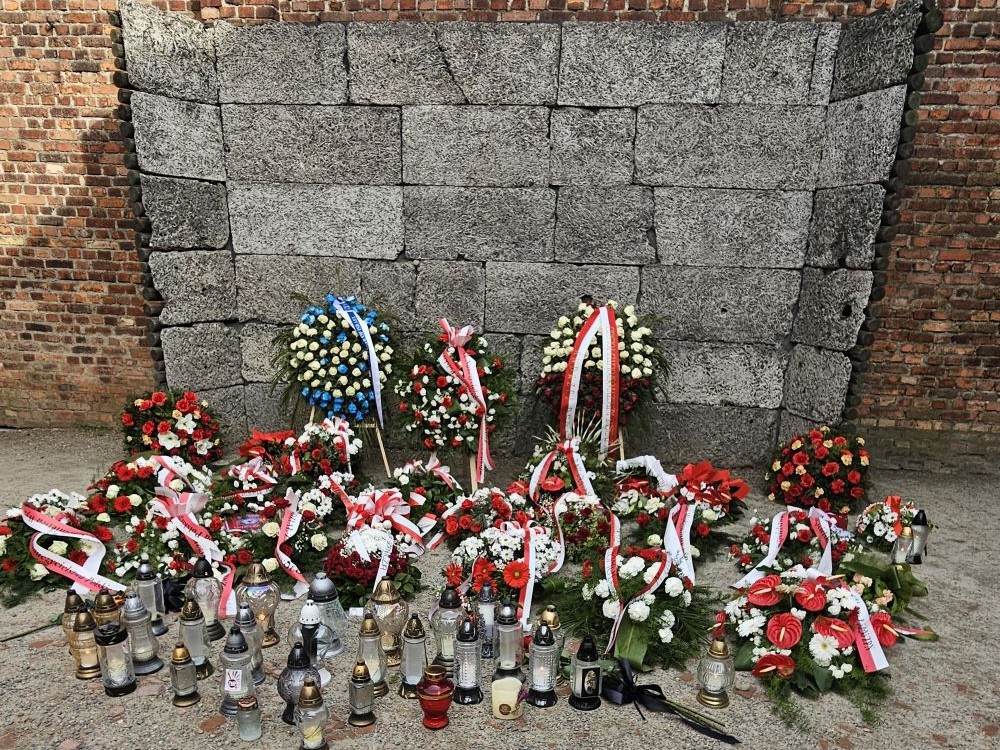
Thousands of victims were shot to death at the execution wall at Auschwitz. (Maryann Agnes Mueller)
I recently was blessed to participate in a pilgrimage to Poland to commemorate the 150th anniversary of our congregation, the Felician Sisters, in North America. The pilgrimage was designed to follow the footprints of our foundress, Blessed Angela Truszkowska, who lived in Poland in the mid to late 19th century. In addition to visiting the places associated with Truszkowska and early community sisters, we learned about Poland's history and how this informed the sisters' lives there.
We stopped one day at the two concentration camps in Auschwitz and Birkenau. The day before, we had heard about the experiences of our Polish sisters in Warsaw during World War II. We saw the bullet holes that remained in our convent walls in Warsaw and learned about the sisters' efforts to protect citizens, particularly the children.
Auschwitz was the largest Nazi German concentration camp. From 1942 until the end of the war, it served as the largest mass extermination center for Jewish people, the majority of whom were murdered in the gas chambers.
The guards transferring the people to the camps, fearing an uprising among the large number of victims being transported, purposely deceived the victims into thinking they were being taken to a work camp. They would suggest victims would be reunited with their families and possessions, telling the victims to put their names and addresses on their luggage so they could later reclaim it.
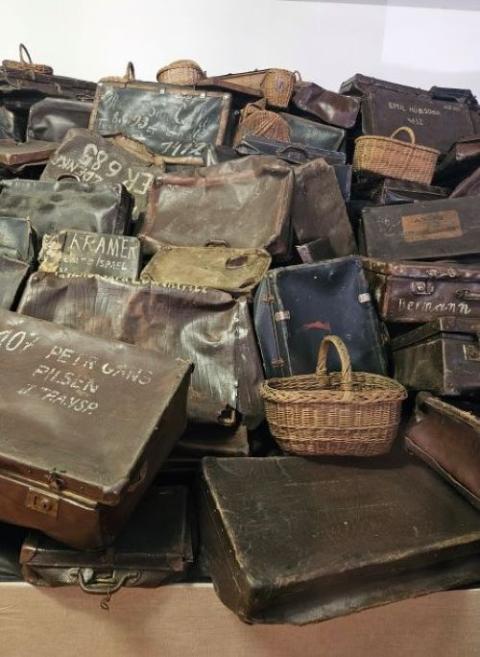
Luggage marked with names and addresses sits at Auschwitz (Maryann Agnes Mueller)
As I entered under the sign at the gate to Auschwitz, "Arbeit Macht Frei," which means "Work makes (you) free," I stood momentarily reflecting on all the families who had entered under this gate during the war and had never been able to walk out. This sign at the entrance was another deceit. Once they entered this gate, very few would leave; many were put to death hours after entering the gate. Those who were able-bodied did leave daily to work long hours of hard labor. They returned to the camp in the evening, exhausted, carrying the bodies of those who had perished during the day.
At Birkenau, we offered a heartbreaking prayer service of lament as we stood next to and on the train tracks where countless people were unloaded. "Out of the depths I cry to you, Lord … Have mercy on your people, forgive us such cruelty," we prayed.
The experiences of Auschwitz and Birkenau compel us to question how such atrocities and dehumanization occurred, and, more importantly, whether it could happen today. The Spanish American philosopher George Santayana wrote in 1905, "Those who cannot remember the past are condemned to repeat it." We must study the past to understand the present and avoid repeating the darkest periods in our history. Moreover, a step to preventing a repeat of history is acknowledging that what occurred at Auschwitz and Birkenau could happen again, could happen today.
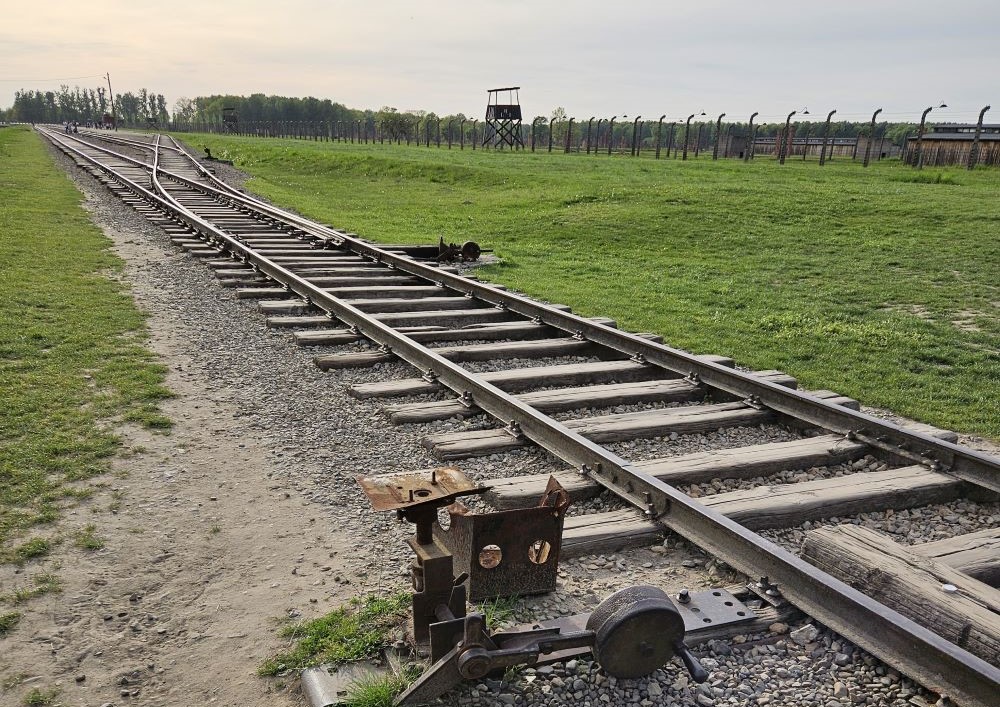
Families taken to Birkenau were separated upon arrival at the end of the railroad line. (Maryann Agnes Mueller)
Auschwitz and Birkenau are chilling reminders of what "othering" and the dehumanization of human beings look like, and can result in. Nazi propaganda used harmful stereotypes to depict Jewish people as less than the human beings stereotyping them. Nazis referred to Jews as vermin, parasites, dangerous predators and promoted false conspiracy theories about them. They were blamed for Germany's problems, becoming scapegoats for economic and social issues.
What allowed human beings to "other" or dehumanize other human beings in the 1940s, who breathed and bled and hoped, as I do, is still with us today. Dehumanization or "othering" takes away the humanity of another human being or group, and treats them as objects. It is fundamental to getting ordinary people to commit acts of hatred and violence and mass murder against other human beings.
Who or what group or community do I demonize? Is there a group or community we are being taught or indoctrinated to demonize? Auschwitz and Birkenau raise questions about our capacity to succumb to scapegoating. We must reflect on our biases and catch ourselves when we find ourselves "othering" another person or group.
Our visit also raised questions on how I would respond. What leads people, including our sisters in Warsaw during the war, to act to at least mitigate violence towards another human being? Or not act at all?
Advertisement
As mass murder of our fellow human beings occurred each day, much of the world stood by. Auschwitz and Birkenau serve as reminders that, as those who follow the nonviolent Jesus Christ, we can and must do better. Both the Old and New Testaments are replete with stories of men and women who used their voices to stand up against the dehumanization and "othering" of other human beings. How are we responding to the demonization and "othering" of individuals and groups of today?
During Angela Truszkowska's leadership of the community, Russia was at war with Poland. At one point, with significant casualties on both sides, she instructed our sisters to go out and take care of both the Russian and Polish soldiers who were injured, telling the sisters, "Take care of all without exception, since everyone is our neighbor."
Truszkowska knew, as did the sisters sent, that some of these Russian soldiers could have maimed or killed the sisters' father or brother. Our foundress' wisdom and the sisters' courage are a testament to the transformative power of love. This is how our Gospel, our risen Lord, Auschwitz, and Birkenau compel us to act. With love for all, everyone is our neighbor, brother and sister because of Jesus Christ. Our love must be stronger, louder and more present than the demonization and "othering" we face daily in our media and in the streets.
